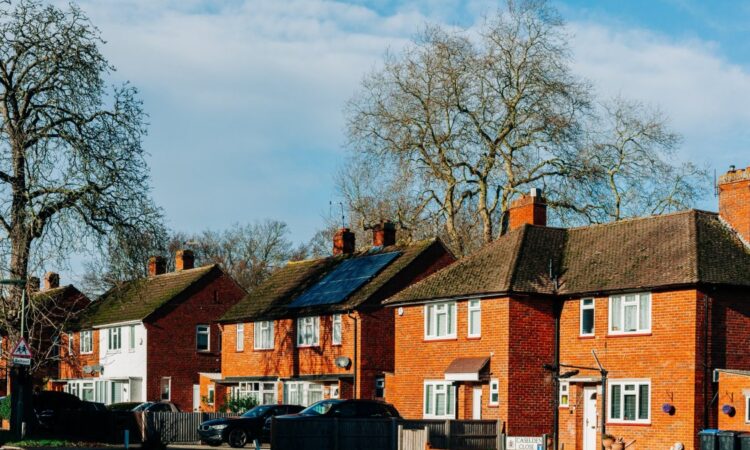
When Soulla Christodoulou’s broker told her the likely monthly sum for her new mortgage deal, her world turned upside down.
“I was in such a panic. I was crying, I couldn’t sleep, and I thought I was going to lose the house,” said Christodoulou, who lives in a four-bed semi-detached house in north London with her three sons.
“It felt like the only option was going to be to sell. My broker told me there was nothing they could do, and I was looking at around £3,500 a month. Rates were going up, too, so it could have gone even higher. It was a really scary time.”
Christodoulou had been on an interest-only mortgage since 2009, when she and her husband got divorced and she was unable to pay the full repayment mortgage on her own. She owes £120,000, so when rates were as low as 1 or 2 per cent, she was paying little more than £150 a month.
But Christodoulou had always been working as a teacher on a regular, full-time salary, so her mortgage broker had been able to simply renew her interest-only deal whenever she needed to remortgage.
By the time her latest deal was up, however, she had become a self-employed author. She didn’t have three years’ worth of earnings to show, and her mortgage would need to move to a standard repayment mortgage — at a much higher rate.
“My broker just said ‘sorry, my hands are tied’. He calculated the monthly sum and it would have been astronomical,” said Christodoulou. “Rates had gone up and I was thinking wow, I’ve been able to hold onto the house all these years but now I’m going to lose it.”
Borrowers being moved onto more expensive loans are also facing higher costs elsewhere. Inflation dropped to 4.6 per cent for the year to October but prices are still around 18 per cent more expensive than they were at the start of 2021.
“The biggest thing is the food bill. I would say it’s gone from about £120 a week to £300,” said Christodoulou. “When you’re buying for a big family, it’s crazy. Gas and electricity suddenly went up from £320 and £500 at one point. I couldn’t afford a massively higher mortgage as well.”
Her first step was to consider equity release. This is a type of lifetime mortgage that lets you access the cash tied up in your home.
The whole idea of an equity release mortgage is that the loan does not need to be paid back until you move into long-term care or die. The interest on the loan is “rolled up” and added to the loan when you pay it off.
This means it can be a very expensive way of accessing the equity in your property as your loan can grow quickly. If you took out an equity release loan of £50,000 at 7 per cent — rates are typically higher on equity release loans compared to standard mortgages — and the house was sold 10 years later, you would owe more like £100,000.
Christodoulou said: “I spoke to two companies and I got to the point where I was ready to sign. I would have to borrow the outstanding £120,000 and I would be locked into this equity release plan, which was stopping me from signing it.”
She even had to speak to her three sons about equity release as it would affect them too, both as her children and as people who lived in the house. Her two eldest sons were supportive, and said that she should do whatever she needed to do to keep the house, while the youngest son was determined that they could pool their wages and cover the extra mortgage costs.
“He was like, ‘no way, you’re not doing that. We can work it out.’ He was doing all these calculations, telling me that they weren’t babies and that they could help me pay the mortgage,” said Christodoulou. “It was really quite incredible.”
One morning, however, as Christodoulou was running over the problems with the equity release deal in her head, she decided to call her bank. She called the customer line, and eventually spoke to the right person to deal with her case.
Four months later, she had a new mortgage deal – for £413 a month.
“I feel very lucky,” said Christodoulou. “I spoke to somebody who was really compassionate about my situation. They were so kind and understanding, I honestly felt like there was a guardian angel looking over me.”
The bank was able to keep her on the interest-only mortgage, despite her lack of stable income or the accounts to show for it. She locked in for five years.
As her mortgage is interest-only, she is not paying off any of the capital that she owes. This means that when her mortgage term is up, which is two years after her current deal comes to an end, she will need to repay the full £120,000.
Christodoulou is far from alone in this position. In the 1990s and 2000s, hundreds of thousands of borrowers took on interest-only mortgages. According to UK Finance, there were 702,000 interest-only mortgages outstanding at the end of 2022 and 220,000 partial interest-only deals.
She said: “I think about having to pay off the loan on and off. I just keep hoping that one of my books will be a bestseller and I’ll be able to pay it back easily.
“I’m overpaying my mortgage by £800 a month, so I am chipping away at the loan. It’s doable to pay that and I can still go out and enjoy myself — I’m not living to pay off the mortgage — but I’m being sensible as well.
“The house is worth £1.4m, so in a worst-case scenario I can sell the property and buy something smaller with the difference.”







